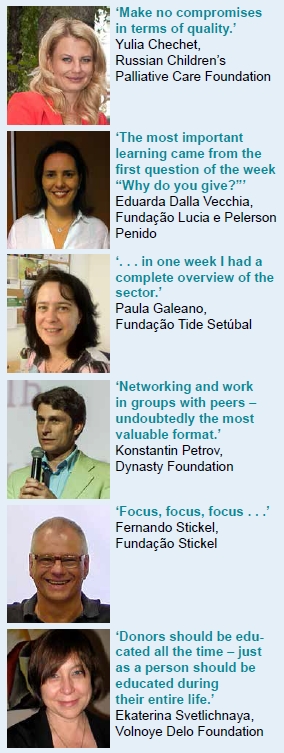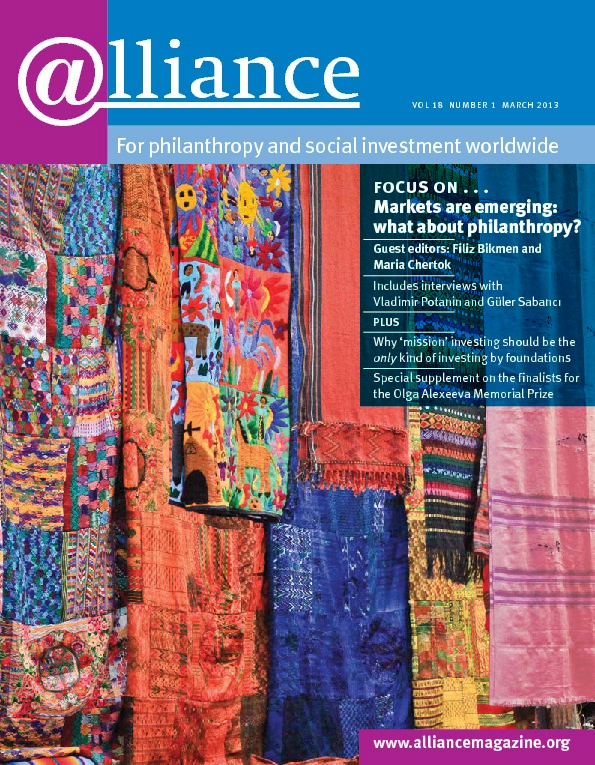Even after the passage of years, those words might strike dismay into the heart of many an adult. Or perhaps not if you are going to the CAF Foundation School. The Foundation School has been run every year since 2009. In May 2012, it was hosted by the Calouste Gulbenkian Foundation in Lisbon. Alliance asked some participants from Brazil and Russia what they thought of it.
Those who were newest to giving probably profited most. ‘I was at the beginning of my career, and in one week I had a complete overview of the sector,’ said Paula Galeano of Fundação Tide Setúbal, a family foundation based in São Paulo. ‘The experience helped to form our way of work: how to think about the budget, performance indicators, administrative expenses, how to work with the board, etc,’ observed Eduarda Dalla Vecchia of Fundação Lucia e Pelerson Penido, a very new foundation.
 Peer exchange
Peer exchange
‘One important aspect is the exchange of experiences among peers,’ she added, summing up the general sentiment: that the opportunity to talk to, work with and learn from peers is of immense value. In some cases, it opened up new lines of thought; in others, it reinforced their sense of purpose. As Ekaterina Svetlichnaya of the Volnoye Delo Foundation in Moscow pointed out, even between countries with different levels of education, standards of living and welfare, ‘all philanthropists some time at some point face the same problems’.
‘Networking and work in groups with peers – undoubtedly the most valuable format,’ thought Konstantin Petrov of Russia’s Dynasty Foundation. This was not so much in terms of the practical details of their work but more about sharing ‘their approaches to their work – a more relevant and more global theme, in my view’.
Another important element of peer exchange was that it allowed frank discussion of success and failure. Both Eduarda Dalla Vecchia and Yulia Chechet of the Russian Children’s Palliative Care Foundation saw this as crucial to improving practice. ‘It is important to keep sharing with peers, and share not only positive experience but the experience of failures as well,’ said Chechet. ‘It makes the picture multi-dimensional.’ In her view it was ‘the openness and the sense of safe space’ created by working with peers that ‘allowed sincere and true stories to emerge’. ‘Sharing with peers is very, very inspiring,’ she concluded.
Main lessons
Ekaterina Svetlichnaya found the main point of interest to be the site visits to the Calouste Gulbenkian Museum, the Calouste Gulbenkian Foundation and ‘the Gulbenkian Science Research Institute’. For her, these visits provided ‘a wonderful illustration of how a private foundation can be responsive to the challenges that the country faces’.
For Yulia Chechet, the main lesson was: ‘Make no compromises in terms of quality’. A foundation ‘should have a clear strategy, good internal processes and instruments to measure its efficiency’ … ‘a professional organization is a place where professionals work and not simply nice people’.
For Fernando Stickel of Fundação Stickel, founded by his father, there were two important lessons, both very specifically to do with the running of his foundation. First, it’s ‘absolutely necessary to promote change in the governance of Fundação Stickel in order to be at the same level as any other organization in the third sector considered “modern”’. Second, it would be good to involve the family and the younger generation in the foundation’s work.
‘The most important learning was to understand the evolution of giving through time and realize that today philanthropy has an important role,’ said Paula Galeano. Along with some others from newly established foundations, she had learned a lot about the nuts and bolts of foundation work – ‘the management of a foundation and the role of the main executive’, as she put it.
For Eduarda Dalla Vecchia, ‘the most important learning came from the first question of the week “Why do you give?”’ It forced her to consider afresh ‘where I want to go and what I want to achieve with my philanthropic work’.
What changes?
What changes had these lessons produced in the approach or practice of participants? ‘The role that foundations play in the development of other charities inspired me to improve the support we give to community organizations we work with,’ remarked Paula Galeano.
‘Focus, focus, focus …’ said Fernando Stickel, who was going to be working hard to find a precise focus for Fundação Stickel. He also planned to look at the issue of governance, paying more attention to building its endowment and reducing costs and is preparing to work in collaboration with others.
Sharper focus was also singled out by Konstantin Petrov: ‘I now approach my work with projects with better focus, with understanding that there is no need to even try to embrace all and everything.’ He added that the knowledge gained had reinforced the ‘confidence and conviction’ he brought to his work.
For Volnoye Delo, the question was still pending. Ekaterina Svetlichnaya had made a presentation to her board based on her experience, and this led her to suggest that the scope of the Foundation School could profitably be extended to include board members, ‘who are responsible for making strategic decisions and are not really involved much in everyday routine work’.
No one had made such profound changes as Yulia Chechet, though, who said she had finalized the strategic mission of the foundation. ‘It was a huge breakthrough for me.’ She reported that she had completely changed her foundation’s management system. It now had an executive director ‘responsible for developing the foundation as a non-profit organization’ and ‘a director, a professional doctor, who is primarily responsible for the professional development of palliative care services provided by out multidisciplinary team’.
Advice and advisers
Where do they go for advice? For Yulia Chechet it was first peers and second, and in cases where more substantial advice was needed, consultants: ‘The fact that there are consultants gives us comfort. I know where to seek support in case we stall for some reason.’ She also saw a particular role for advisers in researching models of NGO-state cooperation and adapting them to a particular context.
In general, the Brazilian participants thought that advice was available if you knew where to look for it. ‘I think that there are enough courses and consultants in Brazil, you just have to find them,’ remarked Fernando Stickel. Eduarda Dalla Vecchia agreed: ‘Many foundation and donors don’t know where to go for advice. I don’t think there is enough communication about these services.’ Among other sources mentioned were IDIS, GIFE, Instituto Geração and specialist law firms.
Whether Russian foundations seek out advice Konstantin Petrov didn’t know, but, he said, ‘I am absolutely convinced that they SHOULD know more’. It is one thing to have belief in one’s work, but in order to act effectively one needs to develop a method.
Lawyers – specialist lawyers – are the main recourse for Volnoye Delo: ‘Sometimes we turn to lawyers for advice because unfortunately in Russia legislation is not perfect and we need to be creative.’ While advice is available in Moscow, she wondered about the rest of Russia and suggested the idea of ‘consultation hubs in the regions where first-hand information can be received’.
Is it worth it?
Overall, what was the verdict on donor education in general, and the Foundation School in particular? ‘In a country without a philanthropic tradition like Brazil,’ said Fernando Stickel, ‘any opportunities to receive advice and exchange with peers will be 100 per cent welcome!’
‘Donors should be educated all the time – just as a person should be educated during their entire life,’ thought Ekaterina Svetlichnaya, because philanthropy is changing all the time. Moreover, as in Brazil, donor education is ‘very relevant because philanthropy is still a new field in Russia’. Paula Galeano agreed in strikingly similar terms: ‘Continued education should be part of our daily routine. The concepts and practices change rapidly and it is important to be in tune with those changes.’ She also noted that donor education is ‘a two-way road’. Donors have a lot to learn, but also a lot to teach.
Yulia Chechet, too, felt that ‘philanthropy advice is a must’. She had a particular suggestion to make in terms of improving the Foundation School: ‘To further this initiative would perhaps mean creating tailored products based on needs assessment of clients, so that clients could have a say in the future curriculum.’
CAF Foundation School
The Foundation School aims to create a platform for philanthropists and foundation executives from emerging markets and around the world to exchange ideas and experiences. With the help of a team of international experts in philanthropy and international development, it teaches participants about international best practice in strategic giving; it also addresses topics such as maximizing philanthropic impact, foundation management and good governance. The School is a five-day intensive course held annually in May in partnership with one of the reputable European foundations or universities. The next Foundation School will take place 20-24 May in the UK.
For more information
Contact Natalie Pinon npinon@cafonline.org



Comments (0)